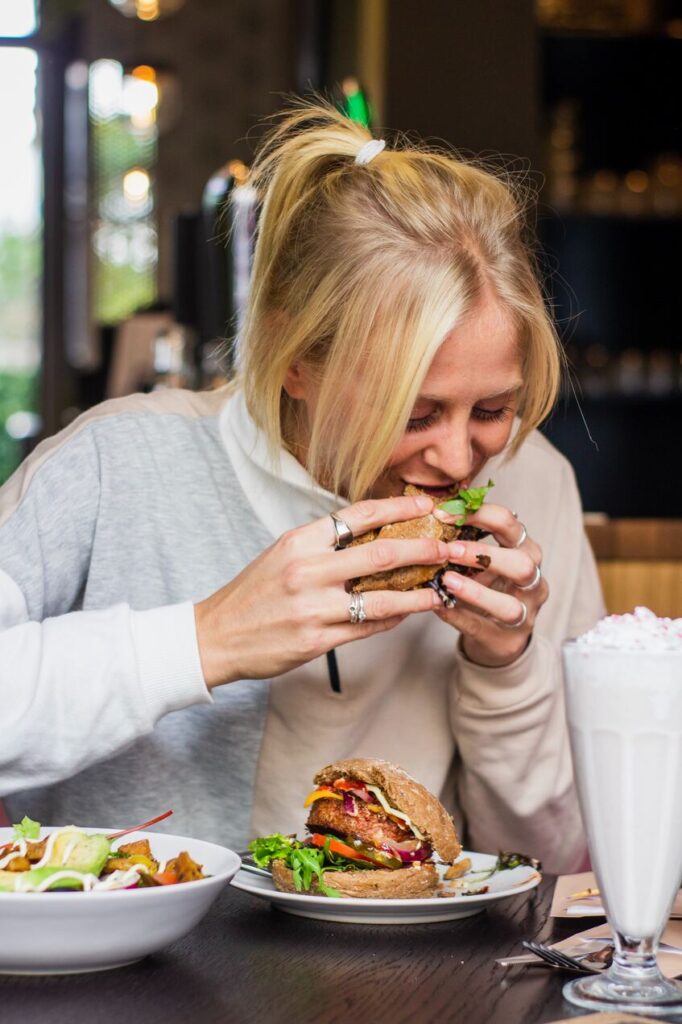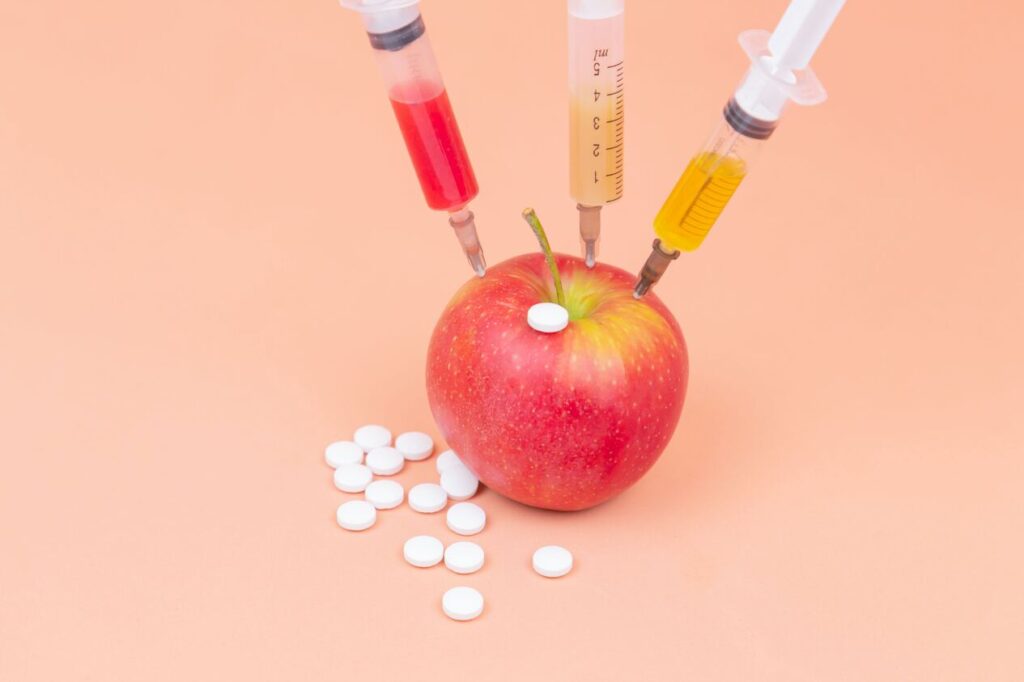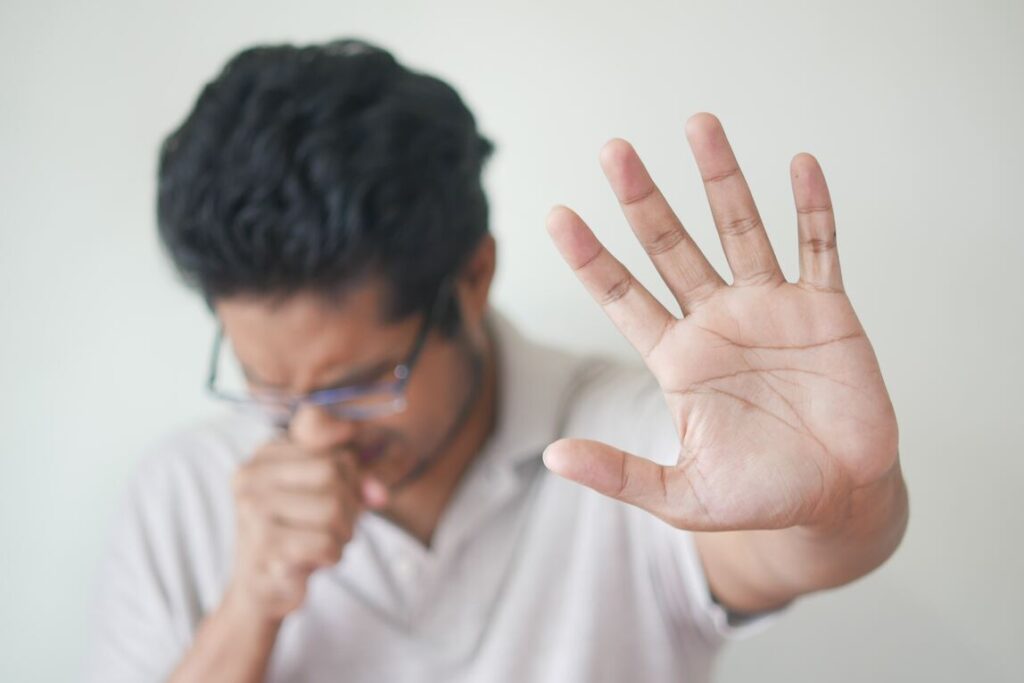
What is Anxiety After Eating?
We all know that feeling of discomfort after a big meal.
But for some, the anxiety and unease can be overwhelming.
If you’re experiencing this type of post-meal distress, it’s important to understand what might be causing it.
One common cause is simply overeating or consuming too much rich or fatty food at once.
This can lead to feelings of fullness and bloating which may trigger anxiety in certain individuals.
Another potential culprit could be an underlying digestive issue such as irritable bowel syndrome (IBS) or gastroesophageal reflux disease (GERD).
In these cases, your body may struggle to process certain foods properly leading to discomfort and anxiety.
Whatever the root cause may be, there are steps you can take to alleviate symptoms and manage your anxiety after eating.

Quick Tip – How To Manage Your Anxiety After Eating
- Practice mindful eating: Slow down while eating so that you pay attention when feeling full.
- Eat smaller meals more frequently throughout the day instead of large ones
- Try relaxation techniques like deep breathing exercises
Signs and Symptoms of Anxiety After Eating
Anxiety after eating can vary from person to person, but common indicators include a racing heart, sweating, and feelings of unease or panic.
These symptoms can be debilitating and impact your daily life in significant ways.
But there is hope!
By incorporating healthy habits into your routine and seeking professional help when needed, you can overcome anxiety after eating for good.
Don’t let this condition hold you back any longer – take control of your health today!
Remember that small changes add up over time.
Start by making simple adjustments like choosing healthier food options or taking a short walk after meals.
Over time these habits will become second nature and lead to lasting improvements in both physical and mental well-being.
So don’t wait any longer – start taking action towards a happier, healthier future today!
Seek out the support you need to overcome anxiety after eating once and for all.
You deserve it!

Causes of Anxiety After Eating
There are several factors that can contribute to anxiety after eating.
One of the most common causes is a poor diet, which can lead to digestive issues and discomfort.
Eating too quickly or consuming large amounts of caffeine or sugar can also trigger feelings of anxiety.
Additionally, certain medical conditions such as irritable bowel syndrome (IBS) or food intolerances may cause physical symptoms that exacerbate anxious feelings.
Mental health disorders like generalized anxiety disorder (GAD) and panic disorder may also be linked to post-meal stress.
Whatever the root cause may be, it’s important to address your symptoms head-on in order to find relief from this debilitating condition.
With proper treatment and support, you can overcome your fears around food and start living life on your own terms once again!

Cause no 1 – Food Triggers
The first cause of post-meal anxiety is food triggers.
Certain foods can trigger physical and emotional reactions that lead to anxious feelings.
For example, caffeine and sugar are known to increase heart rate and stimulate the nervous system, which can contribute to feelings of restlessness or panic.
Other common food triggers include processed or fried foods, alcohol, dairy products, gluten-containing grains like wheat and barley, as well as artificial sweeteners.
If you suspect that certain foods may be causing your post-meal anxiety symptoms, it’s important to keep a food diary in order to identify patterns over time.
Once you’ve identified your specific triggers, try eliminating them from your diet for a few weeks and see if there’s any improvement in how you feel after meals.
You may also want to consider working with a registered dietitian who specializes in digestive health issues or an integrative medicine practitioner who can help guide you towards more nourishing meal choices.
Remember: what we put into our bodies has a profound impact on our overall wellbeing – both physically AND emotionally!
By taking control of your nutrition habits today, you’ll be one step closer towards finding relief from post-meal anxiety once-and-for-all!
Cause no 2 – Allergies and Sensitivities
Another common cause of post-meal anxiety is food allergies or sensitivities.
If you experience symptoms such as hives, difficulty breathing, or swelling after eating certain foods, it’s important to seek medical attention immediately.
However, many people may not realize they have a sensitivity to certain foods until they start paying closer attention to how their body reacts after meals.
Symptoms can include bloating, gas, diarrhea and even mood changes like irritability and anxiety.
If you suspect that your post-meal anxiety could be caused by a food allergy or sensitivity,it’s worth considering an elimination diet where you remove potential trigger foods from your diet for several weeks before gradually reintroducing them one-by-one while monitoring any reactions.
Cause no 3 – Lapsing Back Into Old Habits
Another common cause of post-meal anxiety is lapsing back into old habits.
It’s easy to fall into the trap of eating unhealthy foods or overeating, especially when we’re feeling stressed or tired.
However, these bad habits can wreak havoc on our digestive system and lead to feelings of discomfort and anxiety.
To combat this issue, it’s important to be mindful of what you’re putting in your body and make a conscious effort to stick with healthy choices.
This may mean meal planning ahead of time, packing healthy snacks for work or school, or enlisting the help of a friend or family member for accountability.
Cause no 4 – Negative Experience with Food
Have you ever had a negative experience with food that left you feeling sick or uncomfortable?
Maybe it was something as simple as overindulging in your favorite junk food, or perhaps it was a more serious reaction to an ingredient that didn’t agree with your body.
Whatever the case may be, these negative experiences can have a lasting impact on our relationship with food.
We start to associate certain foods with discomfort and avoid them altogether, which can lead to imbalanced diets and missed opportunities for essential nutrients.
But here’s the thing – just because one particular food doesn’t work well for you doesn’t mean all foods are off-limits.
It’s important to listen to your body and figure out what works best for YOU.
This might involve some trial-and-error experimentation, but ultimately it will lead to greater satisfaction and enjoyment of meals.
So don’t let past negative experiences hold you back from exploring new flavors and ingredients.
With an open mind and willingness to try new things (in moderation), you’ll discover a world of delicious possibilities!
Coping Strategies for Anxiety After Eating

Now, let’s talk about coping strategies for anxiety after eating.
It can be tough to deal with the physical and emotional discomfort that comes along with food-related anxiety, but there are steps you can take to ease your symptoms.
Firstly, try practicing deep breathing exercises or meditation before and after meals.
This will help calm your mind and body, reducing any feelings of stress or anxiousness.
Another strategy is to focus on mindful eating – paying attention to each bite of food you take and savoring the flavors and textures.
This helps shift your focus away from negative thoughts about the meal itself.
If social situations trigger your food-related anxiety, consider bringing a trusted friend or family member with you when dining out.
Having someone familiar by your side can provide comfort and support during potentially stressful situations.
Lastly, don’t hesitate to seek professional help if needed.
A therapist or counselor trained in treating disordered eating behaviors can provide valuable guidance on managing food-related anxieties in a healthy way.
Remember – taking care of yourself both physically AND mentally is key when it comes to enjoying delicious meals without fear or guilt holding you back!
So, if you’re tired of feeling anxious every time you sit down to eat, take action today.
Start by incorporating some of these tips into your routine and see how they work for you.
With a little bit of effort and the right mindset, it’s possible to overcome food-related anxiety and enjoy all the delicious meals life has to offer. So why wait? Take control of your relationship with food today!
References
- Hussenoeder FS, Conrad I, Engel C, Zachariae S, Zeynalova S, Glaesmer H, Hinz A, Witte V, Tönjes A, Löffler M, Stumvoll M, Villringer A, Riedel-Heller SG. Analyzing the link between anxiety and eating behavior as a potential pathway to eating-related health outcomes. Sci Rep. 2021 Jul 19;11(1):14717. doi: 10.1038/s41598-021-94279-1. PMID: 34282257; PMCID: PMC8289991.
- Lim, M.C., Parsons, S., Goglio, A. et al. Anxiety, stress, and binge eating tendencies in adolescence: a prospective approach. J Eat Disord 9, 94 (2021). https://doi.org/10.1186/s40337-021-00444-2







